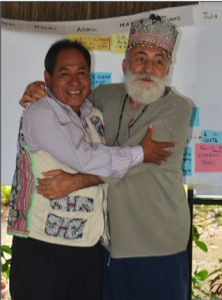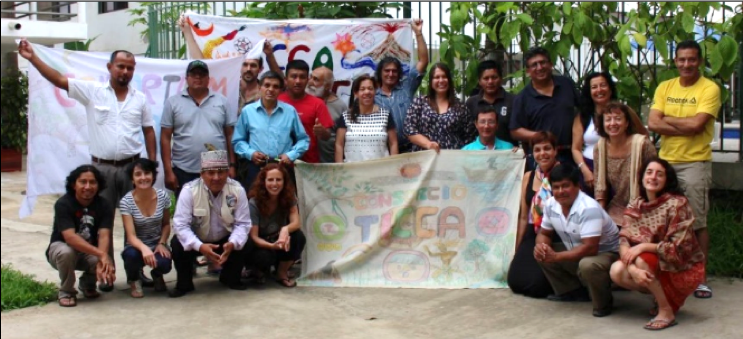First published on 12/29/2015, and last updated on 03/29/2018
On December 5-9 of this past year, the Consortium held two key events on the Pacific Coast of Ecuador… almost on the equator itself. For the first time in its young history, the Consortium held its General Assembly in the Americas, with Spanish as the principle language. This setting provided an opportunity for an internal meeting among coordinators and members of the Steering Committee to plan next year’s activities in Latin America.
The location prompted a discussion about the Consortium’s need to develop communication, beyond English, into the many languages of its members — Spanish, French, Chinese, Portuguese, Farsi, Hindi, and others. In addition, the meeting in Ecuador enlivened ICCA-related discussions about South America (particularly the Andean-Amazonian region). The General Assembly meeting followed a regional exchange workshop on ICCAs that focused on the ICCA Global Support Initiative. It was a notable convergence of people and purpose.
For more information please see the dedicated article below.
Unlike the 2014 GA in the Blue Mountains, which was particularly large, the Consortium decided to hold a relatively smaller assembly this year, but devoted to it two days of intense work and discussions. Although smaller, this assembly included representation of 15 Members, 14 Honorary Members and 3 Steering Committee members, along with several observers, staff and Coordinators from Mesoamerica, the Amazonian region, Brazil, Cono Sur and Europe.

Fraternal hug between Juan Chavez, President of Coshikox (Peruvian Consortium member) and Taghi Farvar, Consortium president (c) C. Miranda
The 2015 meeting highlights: five new Members were elected by general acclaim: the Shuar Arutam people of the Cordillera del Condor of Ecuador; the Center of Intercultural Medical Studies Centro de Estudios Médicos Intercultural (CEMI) of Colombia; the Center for Indigenous Conservation and Development Alternatives (CICADA) of Canada; the Foundation for the Development of Indigenous Culture “The Jaguar’s Footsteps” (Los Pasos del Jaguar) of El Salvador; and the Amazonian Association for Amazonia (Asociación Amazónicos por la Amazonía — AMPA) of Perù. More information on all the new Members can be found in the dedicated section this Newsletter.
The General Assembly discussed the need to revise the Consortium’s membership policy, in particular the need to ensure the quality of new members as well as their roles (are they active? Are they demonstrating commitment to ICCAs?), at a time when the Consortium is growing quite rapidly. These revisions will be included with the other elements of the Operational Guidelines that should be reviewed prior to their official approval. It was suggested, for instance, that proposed new members should be sponsored by existing members, or be able to provide recommendation letters before applying for membership.
The General Assembly also served as a forum for highlighting some emergencies on the continent, notably concerning the Shuar Arutam people of the Cordillera del Condor, who are currently being pressured and threatened with displacement as a result of mining explorations to start imminently in their territory. The ICCA Alert Mechanism exists precisely to respond to such cases!

Lorena Arce presents the General Assembly outcomes at the internal meeting (c) E. Courtine
Another highlight of the meeting was the election by consensus of Raul Petsain as a member of the Consortium’s Steering Committee. Raul is Shuar Arutam from the Ecuadorian part of the Cordillera del Condor, and a longstanding Consortium Honorary Member. As a member of the Steering Committee, Raul takes the torch from Sarah Lili Fortuné, whom we wish well as she steps down to take on new work responsibilities in France. Further details on the General Assembly are available in the full report available in Spanish and English.
Finally, the gathering of the General Assembly offered an opportunity to explain and discuss the Consortium’s work priorities at local, national, regional and international levels. It is crucial to develop more and better ways to exchange knowledge and enhance learning and capacities, as well as to consolidate more and more effective national working groups, coalitions and federations for ICCAs.
Several upcoming events came to the group’s attention, such as a regional workshop on extractivism to be held in Bolivia in May 2016 (to be confirmed), the World Conservation Congress (WCC) in Hawaii in September 2016 and CBD COP 13 in Cancun in December 2016. For the WCC, we have just learned that our proposal for a one-day Conservation Campus on “Securing collective rights and responsibilities for nature (ICCAs) and livelihoods based on its sustainable use” has been accepted.
The General Assembly was followed by an intense two-day regional planning meeting for Latin America, which was attended by ten people from the Consortium Steering Committee and staff. The initiatives and topics discussed included: the importance of effectively managing the many strategic forthcoming events in Mesoamerica, such as the ICCA GSI regional event in Mesomerica (Guatemala, April 2016), the regional event on ICCAs and extractivism (Bolivia, expected in May 2016) and the workshop on ICCAs with the CBD Secretariat, as well as our 2016 General Assembly, which will be held on the occasion of CBD COP 13 (Mexico, December 2016). We also discussed how we might fund activities to be developed in the Andean-Amazonian region, the meaning of “ICCAs” in the large country of Brazil; and next steps for the ICCA GSI in Argentina.
